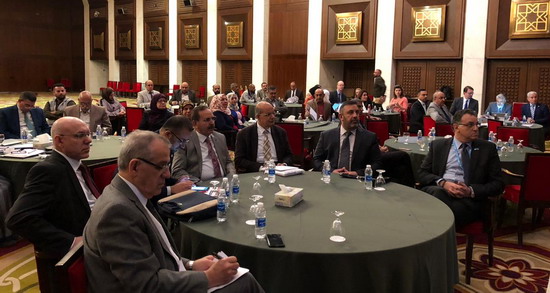
27 March 2019 – Under the auspices of H.E. the Minister of Health of Iraq Dr Alaa Alwan and the WHO Regional Office for the Eastern Mediterranean, in collaboration with WHO country office in Iraq, a national workshop was organized to facilitate assessment of and planning for national public health capacities required under the International Health Regulations (IHR 2005). Implementation of core public health capacities under the IHR is an obligation for national health authorities and requires the involvement of all sectors under a one health approach.
International and regional multidisciplinary experts from WHO headquarters and the Regional Office, the Food and Agriculture Organization of the United Nations, the Eastern Mediterranean Public Health Network and regional academic institutions conducted the comprehensive joint external evaluation (JEE) and development of the national action plan for health security to support the strengthening of Iraq’s preparedness and response capacity to prevent, detect and rapidly respond to public health risks.
As part of the process, in January 2019, a pre-assessment mission was organized with the support of WHO bringing together experts and national authorities and stakeholders to conduct the initial mapping of Iraq’s capacities. From 11 to 20 March 2019 based on their related areas of expertise, participants and experts worked hand in hand to conduct the JEE review process at national and provincial levels. Through insightful discussion and field visits, the resulting recommendations and priority actions informed the development of the national action plan for health security, a country-owned planning process based on a multisectoral one health approach for all hazards. The action plan translated into action, national priorities for health security, bringing all concerned sectors together and identifying needed resources for health security capacity development.

Dr Alwan emphasized the Government’s commitment to strengthening health security preparedness and response, and emphasized the importance of coordination between the Ministry of Health, other line ministries and concerned authorities. “Although we are starting late compared to other countries, we are committed to moving things forward swiftly to fulfil the requirements of the JEE and national action plan and begin implementation immediately. This national plan will guide the short, medium and longer term priority actions that can be implemented to develop and establish a robust and resilient health security system in Iraq,” said Dr Alwan. H.E. the Minister concluded that a well-coordinated multisectoral approach, which was focused on prevention and preparedness, was essential to help Iraq recover from the devastating consequences of the conflict ensuring that national development efforts were not affected by public health threats.
Dr Dalia Samhouri, Manager of Country Health Emergency Preparedness and the IHR at the WHO Regional Office, who led this JEE mission of Iraq, said, “Both missions have helped the country identify critical gaps within their human and animal health systems in order to prioritize opportunities for enhanced preparedness and response.” She added that, “The resulting action plan should be regarded as a core element in strengthening the health security capacities of Iraq. Country ownership, building trust and a shared understanding of the process, along with the support from the highest governmental authorities will be critical in ensuring full implementation of the IHR”. The first draft of the national action plan is ready to be shared with stakeholders for revision. Upon endorsement by national authorities, Iraq will be among the first countries to operationalize its national action plan for health security.

Related link
International Health Regulations


